|
De Peruaanse dichter César Vallejo werd geboren op 16 maart 1892 in Santiago de Chuco, Peru. Zie ook alle tags voor César Vallejo op dit blog.
Sermon on Death
And, finally, passing now into the domain of death,
which acts as squadron, former bracket,
paragraph and key, huge hand and dieresis,
for what the Assyrian desk? for what the Christian pulpit,
the intense tug of Vandal furniture
or, even less, this proparoxytonic retreat?
Is it in order to end,
tomorrow, as a prototype of phallic display,
as diabetes and as a white bedpan,
as a geometric face, as a deadman,
that sermon and almonds become necessary,
that there are literally too many potatoes
and this watery spectre in which the gold blazes
and in which the price of snow burns?
Is it for this, that we die so much?
Only to die,
must we die each instant?
And the paragraph that I write?
And the deistic bracket that I raise on high?
And the squadron in which my skull broke down?
And the key which fits all doors?
And the forensic dieresis, the hand,
my potato and my flesh and my contradiction under the bedsheet?
Out of my mind, out of my wolvum, out
of my lamb, out of my sensible horsessence!
Desk, yes, my whole life long; pulpit,
likewise, my whole death long!
Sermon on barbarism: these papers;
proparoxytonic retreat: this skin.
In this way, cognitive, auriferous, thick-armed,
I will defend my catch in two moments,
with my voice and also with my larynx,
and of the physical smell with which I pray
and of the instinct for immobility with which I walk,
I will be proud while I'm alive—it must be said;
my horseflies will swell with pride,
because, at the center, I am, and to the right,
likewise, and, to the left, equally.
Vertaald door Clayton Eshleman
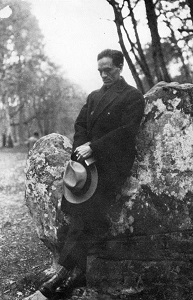
César Vallejo (16 maart 1892 – 15 april 1938)
In Nice, 1929
De Iraanse schrijver Hooshang Golshiri werd geboren op 16 maart 1938 in Isfahan. Zie ook alle tags voor Hooshang Golshiri op dit blog.
Uit: King of the Benighted (Proloog, vertaald door Abbas Milan)
“He was a benevolent king with an insatiable desire to learn the ways and the wonders of the world. At his command, a house was set up where all visitors to the land enjoyed the fruits of his hospitality. There the king, with his keen and curious mind, asked each visitor about his homeland, his travels, his plans and adventures. As men search for precious stones, the king sought to collect tales about other men and their lives. The richer his collection became, the hungrier he was to learn more.
But suddenly the King vanished. Like Simurg, the mythical bird, he too disappeared from our midst. A long time passed and then one day the king, completely dressed in black, reappeared and again ascended his throne.
One night, as I was tending to his needs, he began to lament the turns of his fortune. I sought the secret of his sorrow and this is the story he recounted:
You know of my habit of entertaining visitors to my land. From each I would ask about their city and its wonders. One day a wanderer arrived dressed in black. I asked about his peculiar attire. He asked me to cease my inquiry, reminding me that no one has ever learned the secret of Simurg. The more I preservers, the more he persisted in his silence. "Only the ebony-clad can grasp the essence of this blackness," he said. Yet I persisted, and he finally said:
"There is a beautiful city in China called the City of the Bedazzled. There everyone is in mourning." The wanderer then refused to utter another word and soon disappeared. Amazed by this tale, I resolved to solve the mystery of the city. Yet nobody seemed to know anything about the place. Finally, I temporarily relinquished my throne, and taking some jewels with me, I set out to find that mysterious city.”
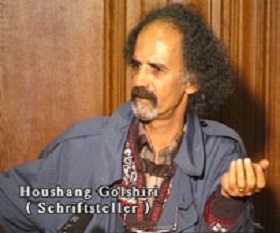
Hooshang Golshiri (16 maart 1938 – 5 juni 2000)
De Amerikaanse schrijfster Alice Hoffman werd geboren op 16 maart 1952 in New York. Zie ook alle tags voor Alice Hoffman op dit blog.
Uit: Seventh Heaven
“To outsiders, the houses might still seem identical, but after six years those who lived here could now easily tell the difference by the color of the trim on the brick fronts, by the flower boxes or the lawn statues or the hedges beside the driveways. Now when the children played kickball on summer nights, they knew exactly which screen door to swing open, and which bedroom was theirs to throw off their damp, sweaty clothes. Mothers no longer tied address tags to their babies’ wrists when they set them out to play in backyards. Even the dogs, who were so confused that first year they huddled together on street corners to howl at noon, now knew precisely where their bones were buried, and where they would stretch out for the night.
To have peace with your neighbors you needed to adhere to two unspoken rules: mind your own business and keep up your lawn. And because they all came from the same circumstances, because this was the first house they, and most likely anyone in their family, had ever owned, the unspoken agreement was keptñuntil Mr. Olivera violated the pact by dying. One day in November, when the sky turned black at four thirty and the children dragged their sleds over to Dead Man’s Hill on the other side of the parkway at the first hint of snow, Mr. Olivera climbed into bed, beneath two wool blankets. He turned on his side, breathed deeply three times, thought about adding antifreeze to the radiator of his Chrysler, then went to sleep and never woke up again.”
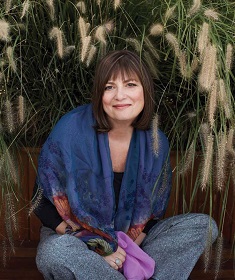
Alice Hoffman (New York, 16 maart 1952)
De Franse schrijver en dichter Sully Prudhomme (eig. René François Armand Prudhomme) werd geboren op 16 maart 1839 in Parijs. Zie ook alle tags voor Sully Prudhomme op dit blog.
Juin
Pendant avril et mai, qui sont les plus doux mois,
Les couples, enchantés par l'éther frais et rose,
Ont ressenti l'amour comme une apothéose ;
Ils cherchent maintenant l'ombre et la paix des bois.
Ils rêvent, étendus sans mouvement, sans voix ;
Les coeurs désaltérés font ensemble une pause,
Se rappelant l'aveu dont un lilas fut cause
Et le bonheur tremblant qu'on ne sent pas deux fois.
Lors le soleil riait sous une fine écharpe,
Et, comme un papillon dans les fils d'une harpe,
Dans ses rayons encore un peu de neige errait.
Mais aujourd'hui ses feux tombent déjà torrides,
Un orageux silence emplit le ciel sans rides,
Et l'amour exaucé couve un premier regret.
Trop tard
Nature, accomplis-tu tes oeuvres au hasard,
Sans raisonnable loi ni prévoyant génie ?
Ou bien m'as-tu donné par cruelle ironie
Des lèvres et des mains, l'ouïe et le regard ?
Il est tant de saveurs dont je n'ai point ma part,
Tant de fruits à cueillir que le sort me dénie !
Il voyage vers moi tant de flots d'harmonie,
Tant de rayons qui tous m'arriveront trop tard !
Et si je meurs sans voir mon idole inconnue,
Si sa lointaine voix ne m'est point parvenue,
A quoi m'auront servi mon oreille et mes yeux ?
A quoi m'aura servi ma main hors de la sienne ?
Mes lèvres et mon coeur, sans qu'elle m'appartienne ?
Pourquoi vivre à demi quand le néant vaut mieux ?
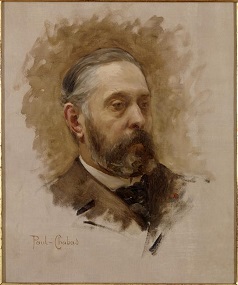
Sully Prudhomme (16 maart 1839 – t september 1907)
Portret door Paul Chabas, 1895
De Franse schrijver en dichter René Daumal werd geboren op 16 maart 1908 in Boulicourt in de Ardennen. Zie ook alle tags voor René Daumal op dit blog.
Triste petit train de vie
Celle qui pourrit dans mon cœur
c'est la lueur qui se nourrit des peurs
qui rôdent chantant le malheur,
en haut, en bas, toujours.
Nuit sur la nuit, c'est fête, enfonçons-la
détresse
sous l'ouate d'une joie épaisse;
nuit sur la nuit, c'est la faiblesse
du cœur brisé
La pourriture est dans mon souffle et ce
vent
c'est le siffleur fascinant, c'est la dent,
c'est le goût de saumure de ce gouffre avant
la fuite en bas.
Plaie du jour à mon flanc !
la nuit, c'est mon sang
qui s'enfuit par ce trou blanc,
soleil qui me baigne jusqu'au petit matin,
m'ôte la faim
au petit matin de ma fin,
personne n'entend, personne,
personne ne tend la main,
je suis l'aiguille,
l'aiguille dans le tas de foin,
le foin sans fin, l'étouffeur à la fin...
personne ne vient, personne ne pleure,
sauf toujours la même, la terreur.
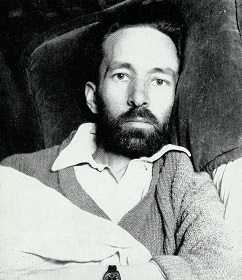
René Daumal (16 maart 1908 – 21 mei 1944)
In 1944
Zie voor nog meer schrijvers van de 16e maart ook mijn vorige blog van vandaag.
|



